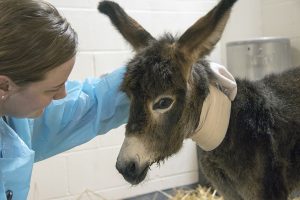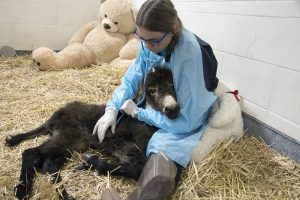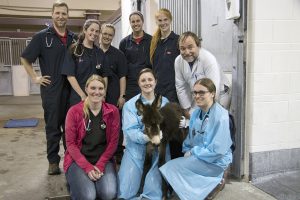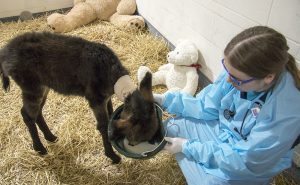Scratch cooks will tell you it takes a lot of pushing, folding, rolling, pulling and stretching to make homemade noodles, but the work is well worth the result. Rescuing, healing and raising Noodles the donkey took a lot of effort from a lot of people. They all agree; however, that the outcome has been well worth the blood, sweat and tears of joy.

Lynn Martin, a specialist in equine internal medicine, calms her 1-day-old patient, Noodles the donkey.
“Noodles came to us on an emergency basis,” recalls Lynn Martin, a postdoctoral fellow, who, at the time, was a resident in large animal internal medicine at MU’s College of Veterinary Medicine (CVM). “She was a foal who had just been born. The mother, or jenny, was part of a group of malnourished donkeys that had been rescued by T&D Donkey Rescue in southwest Missouri. The rescue had provided adequate nutrition and medical care for the remainder of the jenny’s gestation.”
“After Noodles was born, she tried and tried to suckle, but just didn’t have the ability,” says Deanna Kafka, the “D” in T&D Donkey Rescue, located near Liberal, Missouri. “About 9 p.m. — approximately six hours after she was born — we rushed her off to the local vet. She was able to tube in some immunoglobulin G, but Noodles had nothing to eat or drink since birth. I was afraid we would have to euthanize her the next morning, because the mom rejected her. We had to sedate the mom just to try to get Noodles to nurse, but the suckle response never did come. We tried for 11 hours and this little girl never gave up. She never laid down, she never got tired; she just tried and tried.
“We had called another vet hospital, but nobody treats or works with newborn foals that are in distress,” Kafka recalls. “Everybody told us to go to the vet school at MU, and they told us it would be expensive. We’re a 501 (c)(3) nonprofit, so money is just not at our ready disposal. About 2:30 in the morning, I was just exhausted. I felt like I couldn’t save her.

Tracy Swanson, VM4, takes a turn keeping Noodles company. The VHC foal team kept a 24/7 watch on the foal and comforted her while she recovered.
“We did a Facebook post very early in the morning and said, ‘Sadly, we’re not able to save this little girl because there is just no way we have the funds to send her for treatment at MU’s Veterinary Health Center in Columbia,’” Kafka says. “Everybody was like, ‘No, no, you have to save her!’ I had to make a few calls, and we raised enough money so we could at least get in the door, so we were really excited. As soon as those first donations came in, we put her in the car and rushed off. She laid down the entire time. She never even tried to get up, and we’re about five hours away.”
MU’s VHC is open and fully staffed 24 hours a day, 365 days a year. An academic medical center, the VHC offers veterinary students the opportunity to train with licensed veterinarians in the diagnosis and treatment of animals outside of the classroom, in a real-world setting.
“Upon birth, Noodles’ dam did not have good quantity or quality colostrum, and colostrum is really important to foals because they have naïve immune systems that cannot fight infections,” says Martin. “Colostrum provides building blocks to allow a foal to mount an immune response to pathogens, much like a vaccine that a human or older animal might receive.”
Colostrum is the first milk produced by the mammary glands immediately after giving birth. Colostrum is rich in antibodies to protect the newborn against disease, and is generally higher in protein than milk.
“Without immunoglobulins in colostrum, foals get really sick and can die rapidly,” says Martin, who received both doctor of veterinary medicine and master of public health degrees from MU in 2014. “The gastrointestinal tracts of newly born mammals have large pores that allow the immunoglobulins, which are proteins, to be absorbed. Over the next 18 to 24 hours, these pores gradually close. Once they close, animals can no longer absorb immunoglobulins. After that, if they didn’t get colostrum with immunoglobulins from their dam, we have to provide supplementation, usually directly into their vasculature.”
Tests revealed that Noodles did not have an adequate Immunoglobulin G level, so Martin and her team administered a plasma transfusion.

It took a total team effort to rescue the distressed foal. Back row, from left: Hagan Dooley, DVM ’18; Eileen Donoghue, VM4, Mackenzie Luick, VM4, Brienna Rohe, VM4, Abby Schmit, DVM ’18; Professor Philip Johnson, BVSc (Hons), MS, MRCVS. Front row: Alexandra “Sunny” Comly, DVM; Lynn Martin, DVM, MPH; Noodles; Tracy Swanson, VM4.
“Noodles was also very dehydrated. We had to get a little assistance from Dr. Keith Branson, one of our anesthesiologists, because her vessels were pretty much collapsed and Noodles needed a catheter. We also placed a nasogastric feeding tube, because Noodles was weak and didn’t yet know how to drink milk,” says Martin.
“It was a combination of issues that resulted in Noodles needing to see us,” Martin says. “Her dam was subjected to undernourishment and neglect during the beginning of her pregnancy, which can affect a growing fetus. After she was rescued, the dam received adequate nutrition for a pregnant jenny, but some damage or stunting of fetal growth had already occurred. After the dam’s refusal to accept her, we needed to provide those antibodies through a plasma transfusion.
“Noodles was born underweight, compared to a normal donkey foal, which is likely a result of the early pregnancy undernourishment,” Martin says. “That low birth weight and weakness, combined with a lack of colostrum intake, made her highly susceptible to sepsis, an exaggerated systemic inflammatory response to an infection. So, Noodles was hospitalized. She received fluids — including the plasma — and was put on antibiotics, because we knew that she didn’t get adequate immune support from birth. We provided supportive care and monitoring. She learned how to drink out of a bucket, we removed the nasogastric feeding tube, and she turned into a really wild little donkey — she just needed a little therapy.
“It was a huge team effort by all of our students, interns, residents, senior clinicians, and technicians,” Martin says. “We have a foal team, which is usually first- and second-year student volunteers. When we have a foal that needs 24/7 monitoring, they sit at the stall working each shift, including staying overnight. Noodles had someone there all the time and she ended up doing really well.”
*****
Deanna Kafka and husband Tom Kohley, of T&D Donkey Rescue, have devoted their lives and livelihoods to at-risk, neglected, abandoned and abused donkeys. When Noodles was born, Kafka’s commitment to “that little girl” kicked things up a level. Noodles was not just one of 99 equines Kafka and Kohley support on their 800 acres. Noodles was literally a labor of love.
“When we couldn’t get Noodles to suckle, and her mom rejected her, I was pretty devastated at that point because I don’t give up, and being helpless is not in my nature,” Kafka says. “We tried everything. Volunteers stayed with her all night. We cried together, laughed together, prayed together. We held each other.
“We got her up to the VHC and stood watching, praying and hoping,” Kafka says. “We watched all the doctors work on her. She was so dehydrated, Dr. Martin’s team wasn’t even able to get a catheter into her neck. She was 21 hours old and hadn’t had anything to eat or drink. When they tubed her and fed Noodles her first meal, I cried.”
“I’m starting to cry now, just remembering it,” Kafka relates. “I was so excited. I’m invested in that little girl on every level there is.
“We were hopeful when we left there,” Kafka recalls. “We were just so excited that she got her first meal. We videoed the process and sent it out over Facebook. We have thousands of likes and followers on our page, and everybody was so elated. Dr. Lynn Martin and everyone on that team worked their magic and they were able to save her.”
*****
“One of the things I was really concerned about during Noodles’ hospital stay is that most animals are super social, but donkeys are even higher thinkers and more social than the average animal,” Kafka says. “So, I contacted Dr. Martin and asked if there was anybody who could bring her a teddy bear, so she has something in her stall. You know, a foal doesn’t understand this world. Instinct is huge, and Noodles’ instinct was to hang with her mom, but there is no mom. She was all alone. I was worried, so I asked and someone was good enough to get her a teddy bear.
“When we were told that she could finally come home, we were so excited,” Kafka remembers. “A woman from Linn, Missouri, bought her a huge teddy bear. We put pictures of Noodles and her teddy bears on our Facebook page. After that, people kept stopping by, dropping off teddy bears.
“We have an office here, 10 feet by 20 feet, that is heated and air conditioned, so Noodles took up residence in our office. She sort of became one of us,” Kafka says. “We had volunteers with her 24/7 because she didn’t have a mom to comfort and nurture her, to bring that natural sense of security and contentment. When Noodles moved to her stall, volunteers slept on cots in the stall. She had teddy bears in her stall, and she found them and snuggled with them. The teddy bear from the VHC seemed special to her; we named it Egbert.
“She became too attached to us,” Kafka says. “We do not believe in raising any of these animals as orphans. Not long after Noodles was born, we took in another group of donkeys that included three orphans, so we put her in with them. She got really mad. We had to slowly wean her from us and raise her with the other donkeys. She was still pretty mad, and didn’t want to have much to do with the others. She got into everything she was not supposed to, and she knew it — she just wanted attention. But, eventually, she would get tired and just go lay down by her teddy bears. How cool is that?”
*****
Noodles was adopted and is enjoying life on a family ranch in Oklahoma. You can follow her on Facebook at Noodles — A Donkey Tale. Kafka and Kohley continue to care for abandoned and abused donkeys at their rescue in southwest Missouri. Martin finished her residency program in July. She continues as a postdoctoral fellow, serving as a clinical instructor in the hospital, teaching didactic courses and doing lab work for her PhD research. She expects to complete her PhD in 18 to 24 months.




